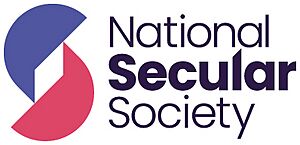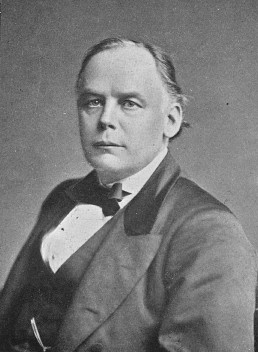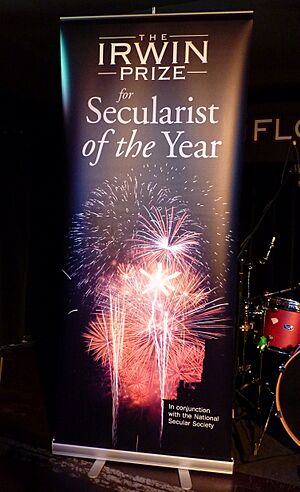National Secular Society facts for kids
 |
|
| Formation | 1866 |
|---|---|
| Founder | Charles Bradlaugh |
| Type | NGO |
| Legal status | Limited company |
| Headquarters | London |
|
Region
|
United Kingdom |
|
President
|
Keith Porteous Wood |
|
Executive Director
|
Stephen Evans |
The National Secular Society (NSS) is a group in Britain. It works to make sure that everyone is treated fairly, no matter their religion. This means that people should not get special treatment or be treated badly because of what they believe, or if they don't believe in a religion. The NSS wants to keep religion and government separate. Charles Bradlaugh started this group in 1866.
Contents
What the NSS Wants to Achieve
The NSS has a motto: "Challenging religious privilege." This means they want to stop any special advantages given to religious groups. They work for a country where there is no official state religion. They believe religion should not be part of government-funded schools. It also shouldn't affect how laws are made or limit what people can say.
The NSS believes the government should not get involved in religious rules. It also shouldn't pay for religious activities. The group wants to make sure everyone is free to believe, not believe, or change their religion.
Even though the NSS was started by people who don't believe in supernatural things, they don't want to stop religion. They believe that freedom of religion is a human right. They also believe in freedom from religion. The NSS thinks that when the government supports certain religions, it takes away these freedoms. They feel that what someone believes should be a private matter. It should be for their home or place of worship, not for public life. The NSS often points out what it sees as problems caused by religion.
How the NSS Started
The National Secular Society began in 1866. Charles Bradlaugh was its first president. Charles Watts was the secretary. Many secularist groups already existed across the UK. They decided to join together to make their campaigns stronger. The word secularism was first used by George Holyoake in 1851. The NSS believed that "this is the only life we have, and that we should work for its improvement."
Bradlaugh faced a big challenge when he tried to become a Member of Parliament (MP). He was elected for Northampton in 1880. He wanted to promise loyalty without swearing on the Bible. When he was told he couldn't, he said he would take the oath. But he was then told he couldn't swear on the Bible if he didn't believe in it.
For six years, Bradlaugh fought this problem. He used legal methods and tried to get re-elected. In 1886, a new government allowed him to be sworn in. He later helped change the law. This change gave all MPs the right to affirm, or promise loyalty, instead of swearing on the Bible. He was a very active MP. He worked to help poor people and supported independence for Ireland and India.
Bradlaugh passed away in 1891. G. W. Foote, who edited The Freethinker, became the next president. Foote felt that Bradlaugh's death ended a "heroic period" for freethought. He found it hard to inspire NSS members as Bradlaugh had.
After Foote, Chapman Cohen was president from 1915 to 1949. He wrote many books and pamphlets about religion and philosophy for everyone to read. In the early 1900s, the NSS worked against the BBC's religious broadcasts. They also campaigned for no official state religion and for secular education.
Later presidents included David Tribe and Barbara Smoker. They helped the NSS share its secularist ideas more widely through the media. In the 2000s, the NSS continues to campaign in the UK and Europe. They work against what they see as special religious advantages in public life.
How the NSS is Set Up
The NSS is officially registered as a UK company. It gets no money from the government or other outside groups. Its work is fully supported by money from its members and donations. The NSS website does not say how many members it has. However, a newspaper article in 2012 said the group had about 7,000 members.
Education and Faith Schools
Education is a very important issue for the NSS. They continue to campaign against the government paying for faith schools. They believe that lessons on right and wrong, and how to be a good citizen, should not be taught as part of religion. The NSS also opposes teaching creationism or intelligent design as science. They believe these ideas are not scientific.
The NSS is also against hiring teachers based on their religion. They want to stop special rules that let religious groups avoid anti-discrimination laws. The Society has successfully campaigned for older students to have the legal right to skip religious assemblies at school.
The NSS argues that children from non-religious families or "the wrong faith" are often treated unfairly when applying to schools. This is because there are many religious schools. The NSS wants these schools to become community schools, open to everyone. They know this change would take time.
The NSS has shown research that supports their claims of unfairness in faith schools. This research suggests that religious schools accept fewer poor students than are in the local area. However, some religious groups and parent associations have said that they do not select students based on their family's wealth.
The NSS believes that faith schools can separate children. They think these schools make religious and cultural differences worse by keeping children from different backgrounds apart. In 2010, the NSS started a judicial review to question if prayers could be part of official council meetings. They believe politics and religion should be kept separate.
Other Campaigns and Activities
The NSS has worked on many other issues. They successfully helped get rid of the blasphemy law in the United Kingdom. This law used to make it a crime to insult religion. They also want to remove the 26 bishops from the House of Lords, which is part of the UK Parliament.
The NSS campaigns against religious groups being exempt from anti-discrimination laws. They want to stop government funding for religious chaplains in prisons, hospitals, and the armed services. They also want to end tax exemptions for churches. The NSS has long argued against public money paying for religious broadcasts like Thought for the Day on the BBC. They see it as religious advertising.
Other campaigns include:
- Stopping doctors and pharmacists from refusing certain treatments based on their beliefs.
- Changing laws about slaughtering animals. They want all animals to be stunned before slaughter. They also want meat from unstunned animals to be clearly labeled.
- Changing the Scouts movement to remove mentions of God from their promise.
The NSS often shares its views with the government and other big UK groups. For example, they have written about religious welfare, doctors' beliefs, and equality issues.
The NSS helped start the Council of Ex-Muslims of Britain. They also co-sponsored a conference for International Women's Day. This event discussed women's rights and religious laws.
The NSS is active in Europe and at the United Nations (UN). They often represent the International Humanist and Ethical Union (IHEU). They have spoken at the Council of Europe and the European Parliament.
At a Council of Europe meeting, the NSS helped change a statement. This change made sure that civil society groups, not just religious groups, were included in talks about different cultures. In Strasbourg, the NSS argued against what they saw as too much religious influence on the Council of Europe. They keep close ties with politicians and staff there.
The NSS also helps at the UN Human Rights Council in Geneva. They work to raise awareness about problems with international bodies.
In the European Parliament (EP), the NSS is part of a group that works on keeping religion and politics separate. The NSS president, Keith Porteous Wood, has spoken at meetings in the EP. He also spoke to the EP President about an invitation for the Pope to address the EP. Politicians often ask the NSS for information and ideas.
In 2011, the NSS and an atheist councillor took Bideford Town Council to court. This was about prayers held during council meetings. In 2012, the court ruled that the council could not lawfully hold prayers as a formal part of the meeting. This was because a law from 1972 did not specifically allow it. However, the judge said prayers could be held if councillors were not required to attend and it wasn't on the official agenda.
Later, a new law in 2011 gave councils more general powers. This was said to allow councils to hold prayers again if they wished. To make it even clearer, a new law in 2015 officially restored the right of councils to have prayers as a formal part of meetings.
The NSS has also campaigned against some local councils giving special parking deals to churchgoers. In 2011, the NSS planned to challenge Woking Borough Council. This council allowed people going to church to get their parking fees refunded. The council kept the policy. However, they said they might extend it to all religious groups or volunteer groups. Some councillors were upset by the NSS challenge.
In 2019, the NSS released a report. It argued that promoting religion should not automatically be seen as a public good. They believe charities should have to show a clear, non-religious public benefit.
Secularist of the Year Award
Every year, the NSS holds a "Secularist of the Year" award ceremony. They give out the "Irwin Prize" of £5,000. Members of the National Secular Society nominate people for the award. The winner is chosen by the Society's leaders and Michael Irwin. He donates the money for the prize. Past winners include former MP Evan Harris, Lord Avebury, MEP Sophie in 't Veld, and Peter Tatchell.
Presidents of the NSS
- Charles Bradlaugh (1866–1890) (A. Trevelyan held the Presidency, 1871–1872)
- GW Foote (1890–1915)
- Chapman Cohen (1915–1949)
- R.H. Rosetti (1949–1951)
- F.A. Ridley (1951–1963)
- David Tribe (1963–1971)
- Ethel Venton (1971–1972)
- Barbara Smoker (1972–1996)
- Daniel O'Hara (1996–1997)
- Denis Cobell (1997–2006)
- Terry Sanderson (2006–2017)
- Keith Porteous Wood (2017–present)
Secretaries of the NSS
- 1866: Charles Watts
- 1876: George Standring
- 1877: Robert Forder
- 1892: Edith Vance
- 1927: John Seibert
- 1951: P. V. Morris
- 1955: Colin McCall
- 1963: William McIlroy
- 1970: Martin Page
- 1972: William McIlroy
- 1977: Jim Herrick
- 1979: Terry Mullins
- 1996: Keith Porteous Wood (executive director)
- 2017: Stephen Evans (chief executive officer)
See also
 In Spanish: Sociedad Nacional Secular para niños
In Spanish: Sociedad Nacional Secular para niños
- National Federation of Atheist, Humanist and Secular Student Societies
- Humanists UK
- Conway Hall Ethical Society
- Humanists International
- Rationalist Association
 | John T. Biggers |
 | Thomas Blackshear |
 | Mark Bradford |
 | Beverly Buchanan |



